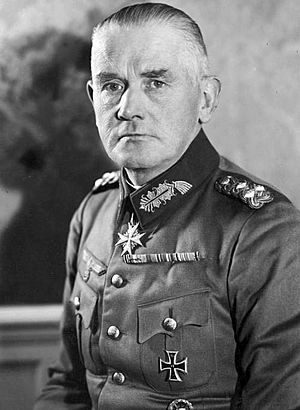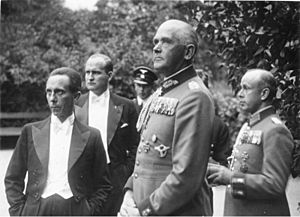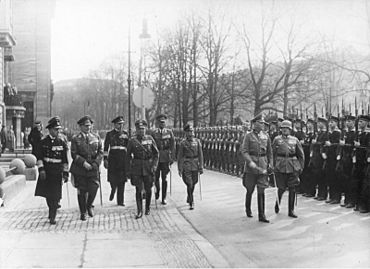Werner von Blomberg facts for kids
Quick facts for kids
Werner von Blomberg
|
|
|---|---|
 |
|
| Reichsminister of War & Wehrmacht Commander-in-Chief |
|
| In office 21 May 1935 – 27 January 1938 |
|
| Preceded by | Himself as Minister of Defense |
| Succeeded by | Wilhelm Keitel as Chief of the High Command |
| Minister of Defence | |
| In office 29 January 1933 – 21 May 1935 |
|
| Preceded by | Kurt von Schleicher |
| Succeeded by | Himself as Reichsminister of War |
| Chief of the Troop Office | |
| In office 27 January 1927 – 30 September 1929 |
|
| Preceded by | Georg Wetzell |
| Succeeded by | Kurt von Hammerstein-Equord |
| Personal details | |
| Born |
Werner Eduard Fritz von Blomberg
2 September 1878 Stargard, Kingdom of Prussia, German Empire |
| Died | 13 March 1946 (aged 67) Nuremberg, Allied-occupied Germany |
| Cause of death | Colorectal cancer |
| Resting place | Bad Wiessee |
| Spouses |
Charlotte Hellmich
(m. 1904; died 1932)Erna Gruhn
(m. 1938) |
| Children | 5 |
| Signature |  |
| Nickname | Rubber Lion |
| Military service | |
| Allegiance | |
| Branch/service | |
| Years of service | 1897–1938 |
| Rank | |
| Commands | 1st Infantry Division, Reichskriegsministerium |
| Battles/wars | World War I |
| Awards | Pour le Mérite |
Werner Eduard Fritz von Blomberg (born September 2, 1878 – died March 13, 1946) was a German military officer. He became the first Minister of War in Adolf Hitler's government in Nazi Germany.
Blomberg served as an officer during World War I. After the war, he became chief of the Truppenamt (Troop Office) in the Weimar Republic. When the Nazis came to power, he was named Minister of War and Commander-in-Chief of the German Armed Forces. Blomberg played a key role in building up Germany's military before World War II. He was forced to leave his position in January 1938.
Contents
Early Life and Military Start
Werner von Blomberg was born in Stargard, Germany (now in Poland), in 1878. He joined the army in 1897. In 1904, he went to the Prussian Military Academy. He married Charlotte Hellmich in April 1904, and they had five children.
Blomberg graduated from the academy in 1907. He joined the German General Staff in 1908. He served bravely on the Western Front during World War I. For his service, he received the Pour le Mérite award.
In 1920, Blomberg became chief of staff for the Döberitz Brigade. In 1921, he was chief of staff for the Stuttgart Army Area. By 1927, he was a major-general. He became chief of the Troop Office. This office was a secret way to keep the German General Staff going, even though it was forbidden by the Treaty of Versailles.
Role in the Weimar Republic
In 1928, Blomberg visited the Soviet Union. He was very impressed by the high status of the Red Army. This trip made him believe that a strong, controlling government was best for military power.
Many German military officers started to believe in a "Defence State" (Wehrstaat). This was a state where everything was focused on military strength. Blomberg's visit to the Soviet Union confirmed his belief. He thought that the next world war would be a "total war." This would mean the whole country, its people, and its economy, would need to be ready for war.
In 1929, Blomberg had a disagreement with General Kurt von Schleicher. Blomberg was removed from his post at the Truppenamt. He was sent to command a military division in East Prussia. East Prussia was separated from the rest of Germany. Blomberg began making lists of all men fit for military service there. This made him believe even more in a strong state that could mobilize everyone for war.
During his time in East Prussia, Blomberg met a Nazi-supporting chaplain, Ludwig Müller. Müller introduced Blomberg to the ideas of Nazism. Blomberg supported the Nazis because he believed only a dictatorship could make Germany a great military power again.
Blomberg worked closely with the SA (the Nazi Party's private army). He saw them as good soldiers. However, he believed the SA should be a junior partner to the regular army. He thought the Nazis could teach young Germans military values. But he wanted the generals to control all military matters. In 1931, he visited the US and openly said he believed a Nazi government would be good for Germany.
In 1932, Blomberg was part of Germany's team at the World Disarmament Conference in Geneva. He continued to make pro-Nazi comments. He also told Paul von Hindenburg, the President of Germany, that Germany needed a new way to build its military strength.
By January 1933, the military decided that only Hitler could create the national unity needed for a strong military. They pressured Hindenburg to appoint Hitler as Chancellor. Blomberg was a key person who told Hindenburg the military's wishes.
On January 28, 1933, President Hindenburg called Blomberg back to Berlin. Hindenburg swore Blomberg in as defense minister. This was done without telling the current chancellor, Schleicher. Two days later, on January 30, 1933, Hindenburg appointed Adolf Hitler as Chancellor. Hindenburg told Hitler that Blomberg would be his defense minister. Hitler was happy with this choice. He told Blomberg that he wanted the Army to remain Germany's main military force.
Minister of Defense Role
In 1933, Blomberg became well-known when he was made Minister of Defense in Hitler's government. Blomberg became a strong supporter of Hitler. He worked hard to make the army bigger and more powerful. For his work, Blomberg was promoted to colonel general in 1933.
Blomberg was chosen by Hindenburg to protect the military's interests. Hindenburg saw Blomberg as someone who would work well with Hitler. He also believed Blomberg would protect the military's special status. This status meant the military did not take orders from the civilian government. Instead, it was loyal only to the head of state.
Blomberg strongly supported the Nazi regime. He worked with them in many ways. In July 1933, Blomberg helped pass a new Army Law. This law meant that civilian courts could no longer judge military members.
Blomberg's first action as defense minister was to remove officers who were close to his rival, Schleicher. He replaced them with his own trusted people. The British historian Sir John Wheeler-Bennett noted how Blomberg worked to weaken the power of the army commander-in-chief, General Kurt von Hammerstein-Equord. Hammerstein resigned in February 1934 because his power was gone.
Blomberg was strongly against the military being controlled by the Nazi Party or its groups like the SA. He fought hard to keep the military independent. By late 1933, Blomberg was in conflict with Ernst Röhm, the head of the SA. Röhm wanted the SA to take over the regular army. Blomberg told Hitler that the Army would never accept this. On February 28, 1934, Hitler decided that the regular army would remain the main military force.
To protect the military's independence, Blomberg made the military more like the Nazis. He hoped this would show Hitler that the military was loyal. This way, Hitler would not need to take away the military's special status.
In February 1934, Blomberg ordered all soldiers with "Jewish blood" to be immediately removed from the army. This was his own idea. As a result, 74 soldiers lost their jobs. The German historian Wolfram Wette called this "an act of proactive obedience." Blomberg wanted to show Hitler that the army was even more loyal than the SA. In May 1934, Blomberg also had the army adopt Nazi symbols on their uniforms. In 1935, he made sure the military followed the Nuremberg Laws. These laws prevented people of mixed heritage from serving.
Blomberg was sometimes called "Rubber Lion" by critics. This was because he seemed to follow Hitler without question. However, he played a key role before the Night of the Long Knives in June 1934. President Hindenburg was unhappy with the growing tension in Germany. He decided that if Hitler did not control the SA, he would declare martial law. Blomberg was chosen to tell Hitler this decision.
On June 21, 1934, Hitler met Hindenburg. Blomberg was present at the meeting. He told Hitler that Hindenburg was very displeased. Hindenburg threatened to remove Hitler as chancellor if he did not control the SA. Blomberg knew about the purge Hitler was planning. On June 29, 1934, an article by Blomberg appeared in a Nazi newspaper. It stated that the military supported Hitler.
After Hindenburg's death in August 1934, Blomberg ordered all soldiers to swear an oath of loyalty to Adolf Hitler. This oath was not to the country, but to Hitler as the new leader. This idea came from Blomberg and General Walther von Reichenau. They wanted to create a special bond between Hitler and the military. They hoped this would keep Hitler closer to the military and away from the Nazi Party. Blomberg later said he did not fully think about the consequences of this oath at the time.
Blomberg also fought against the SS trying to create its own military force. He eventually agreed to the idea, which later became the Waffen-SS.
Commander-in-Chief and Minister of War
On May 21, 1935, the Ministry of Defense was renamed the Ministry of War. Blomberg was also given the new title of Commander-in-Chief of the armed forces (Wehrmacht). Hitler remained the Supreme Commander as the leader of Germany. On April 20, 1936, Blomberg became the first Generalfeldmarschall appointed by Hitler. In January 1937, Hitler gave Blomberg the Golden Party Badge, making him a member of the Nazi Party.
In December 1936, there was a disagreement about Germany's involvement in the Spanish Civil War. General Wilhelm Faupel wanted to send three German divisions to Spain. Foreign Minister Baron Konstantin von Neurath wanted to limit Germany's involvement. Blomberg argued against sending more troops. He said it could start a bigger war before Germany was ready. He also said the money was better spent on modernizing Germany's military. Blomberg's view won.

Blomberg's high position made Hermann Göring and Heinrich Himmler unhappy. Göring was Hitler's second-in-command and head of the air force. Himmler was head of the SS and all police forces. Both wanted more power. They worked together to remove Blomberg from his position. Göring especially wanted to be Commander-in-Chief of the entire military.
On November 5, 1937, Hitler met with his top military and foreign policy leaders. This meeting is known as the Hossbach Memorandum. Hitler stated it was time for wars to gain more land for Germany. He argued that an arms race with France and the United Kingdom meant Germany needed to act soon.
Blomberg, along with Foreign Minister Konstantin von Neurath and Army Commander-in-Chief General Werner von Fritsch, raised concerns. They said German actions in Eastern Europe could start a war with France. They also thought Britain would likely join the war. They advised Hitler to wait until Germany was better prepared. They did not disagree with Hitler's overall goals, only the timing.
After this meeting, Blomberg was one of the few who criticized Hitler's plans for war. However, by early 1938, he changed his mind.
Later Life and Death
Blomberg's health got worse while he was held in Nuremberg after the war. He was diagnosed with colorectal cancer in February 1946. He became depressed and stopped eating.
Werner von Blomberg died on March 13, 1946. His body was buried without a ceremony. His remains were later cremated and placed in his home in Bad Wiessee.
Images for kids
See also
 In Spanish: Werner von Blomberg para niños
In Spanish: Werner von Blomberg para niños
 | Roy Wilkins |
 | John Lewis |
 | Linda Carol Brown |






